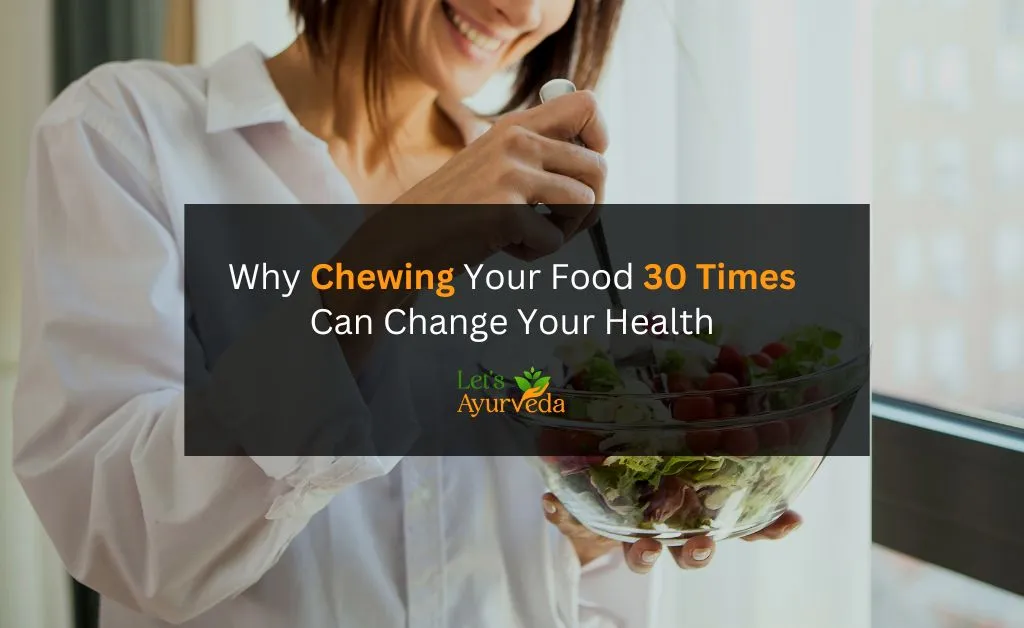Have you ever eaten a meal so fast that you barely remember tasting it? Many of us rush through meals, barely chewing before swallowing. But what if I told you that slowing down and chewing your food 30 times per bite could make a big difference in your health?
It might sound strange, but chewing your food properly helps your body in many ways. From better digestion to improved energy levels, this simple habit can have a huge impact. Let’s explore why chewing your food 30 times is so important and how you can start doing it today.
What Happens When You Chew Your Food Properly?
Chewing is the first step in digestion. When you take the time to chew your food well, you’re helping your stomach and intestines do their job more easily. Here’s what happens when you chew each bite 30 times:
1. Your Digestion Improves
Your stomach doesn’t have teeth! If you swallow big chunks of food, your stomach has to work extra hard to break them down. Chewing turns food into a soft paste, making it easier for your stomach to digest.
2. You Absorb More Nutrients
When food is broken down properly, your body can take in more vitamins and minerals. If you swallow big pieces, some nutrients might pass through without being absorbed. Chewing well helps you get the most out of your meals.
3. You Feel Full Faster (And Eat Less!)
It takes about 20 minutes for your brain to realize you’re full. If you eat too fast, you might overeat before your brain gets the signal. Chewing slowly helps you feel satisfied with less food, which can help with weight management.
4. You Enjoy Your Food More
Have you ever really tasted your food? Chewing slowly lets you enjoy the flavors and textures. Eating becomes more enjoyable when you take your time instead of rushing through it.
5. Less Gas and Bloating
Swallowing large pieces of food can cause gas and bloating because your stomach struggles to break them down. Chewing well reduces these uncomfortable problems.
How Chewing 30 Times Can Change Your Health
Now that you know what happens when you chew properly, let’s look at the long-term health benefits:
Better Gut Health
A healthy gut means better digestion and a stronger immune system. When you chew well, you reduce the strain on your stomach and intestines, keeping your gut happy.
More Energy
When your body absorbs nutrients efficiently, you get more energy from your food. Instead of feeling sluggish after meals, you’ll feel energized and ready to go.
Healthier Weight
Since chewing slowly helps you eat less, it can prevent overeating. This makes it easier to maintain a healthy weight without strict diets.
Stronger Teeth and Gums
Chewing is like exercise for your mouth! It strengthens your jaw and increases saliva production, which helps protect your teeth from cavities.
How to Start Chewing 30 Times Per Bite
If you’re used to eating quickly, chewing 30 times might feel strange at first. Here’s how to make it a habit:
1. Put Your Fork Down Between Bites
This simple trick forces you to slow down. Instead of loading up the next bite right away, focus on chewing the one in your mouth.
2. Count Your Chews
At first, you might need to count to 30 for each bite. After a while, it will become natural, and you won’t need to count anymore.
3. Eat Without Distractions
Watching TV or scrolling on your phone while eating makes it easy to eat too fast. Try eating at the table without screens so you can focus on your food.
4. Choose Foods That Need Chewing
Soft foods like mashed potatoes or yogurt don’t require much chewing. Try adding crunchy vegetables, nuts, or whole grains to your meals—they naturally make you chew more.
5. Take Smaller Bites
Smaller bites are easier to chew thoroughly. Instead of stuffing your mouth, take modest bites and chew them well.
Common Questions About Chewing 30 Times
Do I really have to chew 30 times for every bite?
Thirty is a good goal, but some foods (like soup or yogurt) don’t need that much chewing. For most solid foods, aim for 20-30 chews per bite.
What if I get tired of chewing so much?
It might feel tiring at first, but your jaw will get used to it. Think of it as training a muscle—it gets easier with practice!
Will this really make a difference in my health?
Yes! Many people notice better digestion, less bloating, and more energy after making this change. It’s a small habit with big benefits.
Final Thoughts: Slow Down and Chew!
Chewing your food 30 times might seem like a small thing, but it can have a huge impact on your health. Better digestion, more energy, and even weight control are all possible just by slowing down at meals.
The next time you eat, try counting your chews. At first, it might feel strange, but soon it will become a natural part of your routine. Your body will thank you!
Do you think you can try chewing 30 times at your next meal? Give it a shot and see how you feel. Small changes can lead to big improvements in your health!






